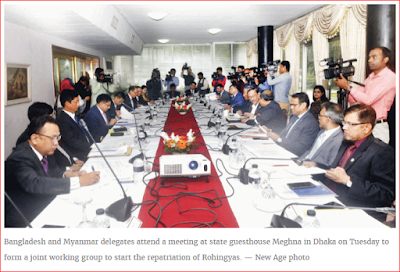Shahidul Islam Chowdhury (NewAge)
Bangladesh and Myanmar on Tuesday formed a joint working
group and finalised terms of reference of the group to supervise all aspects of
the repatriation of Rohingyas to Rakhine State.
Foreign secretary M Shahidul Haque and Myanmar foreign
ministry’s permanent secretary Myint Thu signed an instrument in this regard
articulating formation of the group and terms-of-reference after about a
four-hour talk in Dhaka.
The two countries formed a 30-member joint working group,
15 from each side, foreign minister AH Mahmood Ali said at a briefing after the
talks.
The two sides ‘have started the next steps’ (on
repatriation of Rohingyas) with the signing of the instrument for repatriation
of Rohingyas, Ali said referring to the instrument signed with Myanmar on
November 23.
#Myanmar_Bangladesh #JWG formed, their terms &
conditions are stated here. No #Rohingya will return without solving root
causes. #MyanmarGovt has killed abt 15,000 in a short period. We hope #BD will
not kill us too, will not force us as before. We are in fear of force
repatriation. https://t.co/C5zytGooJt
A secretary-level officer of the foreign ministry would lead the Bangladesh side in the JWG with Chittagong divisional commissioner, representatives from the Prime Minister’s Office, disaster management and home ministries, Armed Forced Division, Border Guard Bangladesh, national security agencies and Refugee Relief and Repatriation Commissioner, among others, on the team.
A permanent secretary at Myanmar’s foreign ministry would
lead the Myanmar side in the talks with representatives from military of the
country and other ministries and departments.
 A PICTURE OF HYPOCRISY: Joint Working Group formed to
oversee #Rohingya return. A process
without any third party involvement. And a verification process which is
effectively Myanmar's get out clause. https://t.co/vJtpk5WIF0
https://t.co/AK1LDn0m6s
A PICTURE OF HYPOCRISY: Joint Working Group formed to
oversee #Rohingya return. A process
without any third party involvement. And a verification process which is
effectively Myanmar's get out clause. https://t.co/vJtpk5WIF0
https://t.co/AK1LDn0m6s
The agreed TOR mandated the JWG to undertake all
necessary measures to start the safe and voluntary return, resettlement and
reintegration process of displaced Myanmar residents as envisaged in the
‘Arrangement on Return of Displaced Persons from Rakhine State’ signed by
foreign minister AH Mahmood Ali and Kyaw Tint Swe, Myanmar union minister, at
the State Counsellor’s Office on November 23.
According to the TOR, the JWG will develop physical
arrangement for return, which would include mechanism of verification, time
schedule, transport and logistics arrangements, reception procedures,
communication etc to commence the repatriation process within the stipulated
time frame mentioned in the ‘arrangement’.
The JWG ‘shall ensure’ commencement of repatriation
within two months of the signing of the ‘arrangement’, officials said.
The JWG ‘shall involve’ assistance of the UNHCR and other
mandated UN agencies and interested international partners in various stages of
repatriation.
The JWG will also assess the process and report to the
respective governments quarterly about the situation of Rohingya return.
It has mandated the members of the JWG to undertake field
visits in Rakhine State to see progress of implementation of the deals.
The JWG might form technical working groups involving
other ministries and divisions to help it work responsibly.
It has authorised the JWG sides to refer matters to the
upper levels of respective governments to resolve disagreements.
The two sides agreed to provide access to media on both
sides of the border.
The two sides are expected to sign a specific bilateral
instrument in ‘a speedy manner’ on physical arrangement for repatriation, which
includes developing a mechanism for verification of Rohingyas who crossed over
to Bangladesh from Myanmar, setting a time schedule, transport and logistics
arrangements, reception procedure and communication system between both sides,
a senior government official said.
Both sides also agreed that the process of return should
commence within two months from November 23 and ‘be completed within a
reasonable time from the date the first batch of returnees is received’.
The two sides also agreed to consider the repatriation of
Myanmar residents who crossed over to Bangladesh before October, 2016, on the
conclusion of the return of Rohingyas who fled violence in Rakhine State after
October last year.
Over 6,55,000 Rohingyas, mostly women, children and aged
people, entered Bangladesh fleeing unbridled murder, arson and rape during
‘security operations’ by Myanmar military in Rakhine, what the United Nations
denounced as ethnic cleansing, between August 25 and December 15.
Several
international authorities denounced the operations as genocide.
The ongoing Rohingya influx took the total number of
undocumented Myanmar nationals and registered refugees in Bangladesh to over
10,74,000 till December 15, according to estimates by UN agencies.
The arrangement was based on the joint statement signed
by the foreign ministers of the two countries in 1992 and contained the general
guiding principles and policy arrangements to systematically verify and receive
the displaced persons from Rakhine State.


